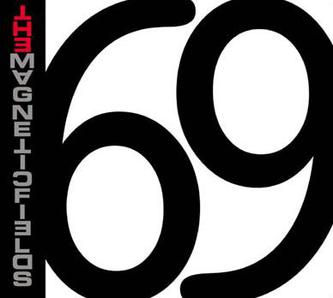69 Love Songs
- Sep 7, 2023
- 2 min read
The story goes like this…Stephin Merritt was sitting in a gay piano bar in Manhattan, listening to the pianist’s interpretations of Stephen Sondheim songs, when he decided he should get into theater music because he felt he had an aptitude for it. He was going to write 100 love songs, but soon realized how long that would be, so he settled on sixty-nine.

On this day in 1999, The Magnetic Fields released their groundbreaking album 69 Love Songs.
Merritt has stated that the massive triple-disc, three-hour opus is simply a writing exercise, a parlor trick - It’s not a work of personal expression. In fact, Merritt claims the album is not about love. It’s an album about love songs, which are very far away from anything to do with love. Confused?
Merritt’s genius is that he takes three-hours to explore the entire vocabulary of popular music, switching genres on songs that are full of deep references, jokes and absurd stories. Where most artists write love songs about human feelings, Merritt has written songs about how humans have written about human beings in popular songs over the years. Through a rotating cast of musicians and characters (including Daniel Handler, the writer who was just taking on the Lemony Snicket alter-ego), The Magnetic Fields created something innovative and pretty spectacular.
The song that most people would recognize first is “The Book of Love”. A gorgeous song with a scant amount of guitar strumming behind the huge baritone vocals from Merritt. But is it a love song? Many have used it for their wedding dance, but even Merritt isn’t sure why. It’s really about the ambivalence of love - I mean, the first line is “The book of love is long and boring - No one can lift the damn thing.”
The more you dig into the treasure chest of songs, you’ll recognize the true influence of writers and songwriting duos, rather than pop stars/rock stars that Merritt could have followed. Rogers and Hart, Sondheim, Kerouac just to name a few. His soul seems so much older than the 34 year old who recorded all these songs.
I had a vision back in the day that I’d want to write and film 69 shorts based off of each song - that never happened, but that’s also how these songs struck me. Stories that captured your imagination.
The sheer goofiness of the track “The Luckiest Guy on the Lower East Side” with guest vocals from new wave artist Dudley Klute combines the best of Broadway and The Knitting Factory. “I Think I Need A New Heart” is both a catchy love song and wrenchingly painful.
“Reno Dakota” has some of the best word play on the album. “Washington, D.C.” is as cheery a song as you’ll get here - an ode to not only the city itself, but to a long-distance relationship. “I Don’t Want to Get Over You” is about the post-break-up acceptance, which is sometimes harder than the actual break-up.
69 Love Songs is considered a landmark album and is celebrated for its innovative approach to songwriting and its ability to connect with listeners on both intellectual and emotional levels. It’s enduring popularity, years later, is a testament to its lasting impact on the world of indie pop music.
.jpg)



Comments